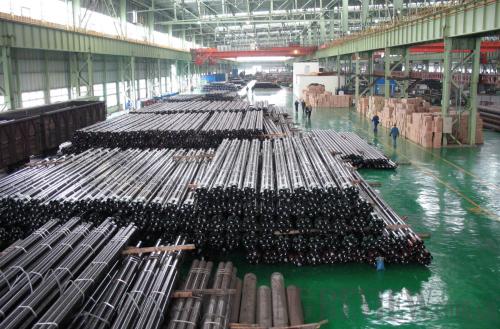|
 |
| AMERICAN ACTION: Steel pipes produced by Hengyang Valin Steel Tube Co. Ltd. in Hunan Province are sold in more than 40 countries and regions of the world. The United States carried out anti-dumping and countervailing investigations on Chinese steel pipes and tires since October (SU XIAOZHOU) |
This viewpoint held by the U.S. Govern-ment, however, seems farfetched to many Chinese. At a seminar on trade, China and world economic order held in Beijing on October 23, Wu Xiaoling, Vice Chairman of the Finance and Economic Committee of the Standing Committee of the 11th National People's Congress, said trade surpluses or deficits are mainly caused by factors such as changes of the productivity layout and different labor costs. The global trend has seen countries that master new technologies—headed by the United States—transferring many of their manufacturing industries to emerging countries that have cheaper labor, while they themselves focus on developing service, financial and hi-tech industries. These changes in the productivity pattern and manufacturing industries decide the trade surplus and deficits, Wu said.
After realizing a free-floating exchange rate, Deutsche mark and Japanese yen both appreciated sharply against U.S. dollar, Wu said. By now, such appreciation hasn't completely eliminated the trade surplus by Germany and Japan against the United States.
Tu Xinquan, Deputy Director of the China Institute for WTO Studies of the University of International Business and Economics, thinks that the increase of trade frictions between China and the United States is actually closely related to the domestic economic situation in the United States, where a high unemployment rate and an industrial base in recession dominate the American economic landscape. In order to protect its domestic market and employment under such harsh economic conditions, the government is quick to yield to the country's trade protectionists.
Moreover, economic factors are not the only motive for the United States to launch trade protectionist measures. Domestic political pressure could also play an influential role in these kinds of trade actions. Strategic factors have also been known to play a more important role than economic factors in anti-monopoly actions. The current economic crisis and domestic political struggles in the United States will only see a recurrence of American resistance to Chinese products, Tu said.
Mei Xinyu, a researcher at the Chinese Academy of International Trade and Economic Cooperation of the MOFCOM, thinks that China has found itself in the present trade situation because of previous ineffective counterblows.
On one hand, the Chinese Government seldom uses trade retaliation measures during trade disputes. When it does, many measures are not as serious as they could be, allowing foreign governments and companies to all but ignoring China's determination to take decisive actions to protect its interests.
On the other hand, when facing trade remedy investigations by other countries, Chinese companies do not often have a firm understanding or ability to take effective measures to cope with the litigations. At times, Chinese firms will simply not respond to the charges, leaving the impression that they are weak and open to bullying, which only encourages trade protectionism to some extent, said Mei.
The case seems to be repeating itself now between China and the United States, as China is only hesitantly engaging in the trade dispute by launching token counterblows.
Is trade war possible?
A trade war between China and the United States would only make the two sides suffer financially and economically. China resolutely opposes trade protectionism, an act that will only seriously harm the international trade environment, greatly weaken the effect of economic stimulus measures adopted around the globe and obstruct the overall economic recovery, Yao said.
| 